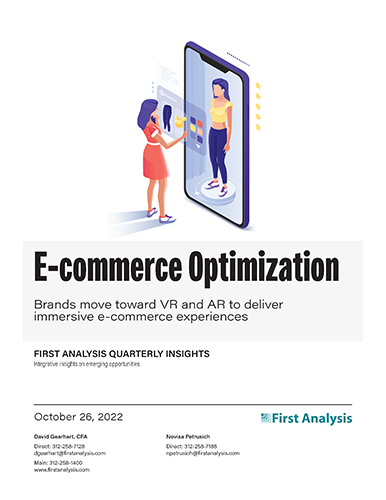Quarterly insights: E-commerce optimization
Brands move toward VR and AR to deliver immersive e-commerce experiences

The metaverse is poorly understood and has failed to gain traction as a concept, in large part because many offerings to date have focused on niche or novelty uses that have little or no relevance to most people.
But we think key technologies underpinning the metaverse – virtual reality, augmented reality, and extended reality – have significant potential when applied to e-commerce to enhance the everyday experience of the billions of people who shop online.
We expect brands and retailers to increasingly demand technologies that help them compete and increase sales by delivering more engaging, immersive online experiences, particularly those that help consumers better understand and appreciate product qualities via online interactions that replicate experiences of holding, examining and evaluating products in stores.
We discuss how these technologies work, key application areas, why sellers and consumers find them compelling, and which immersive technology provider strategies seem most likely to succeed. We also profile several interesting immersive technology providers.
TABLE OF CONTENTS
Includes discussion of 10 private companies
- Focus on immersive environments, relatable use cases to replace overhyped metaverse
- Many types of immersive e-commerce environments
- The potential audience and user base for immersive e-commerce is substantial
- Compelling reasons to adopt immersive capabilities
- Multi-year tailwind for thoughtfully positioned solutions
- Representative vendors
- Compelling opportunity in tech for immersive e-commerce experiences
- First Analysis E-commerce Optimization Index rangebound near one-year low
- E-commerce optimization M&A pace slows
- E-commerce optimization private placement pace slowed in Q3
Focus on immersive environments, relatable use cases to replace overhyped metaverse
Most people have encountered the term metaverse, particularly since Facebook adopted the name Meta to reflect its metaverse ambitions. However, despite the broad awareness, most people do not understand what the metaverse means. Without a widely accepted and understandable definition, metaverse proponents have stumbled in their efforts to educate the market. Their reliance on general descriptions – for example, the metaverse represents a merging of the real and digital worlds – provides insufficient insight and often creates confusion.
Most people have encountered the term metaverse, particularly since Facebook adopted the name Meta to reflect its metaverse ambitions. However, despite the broad awareness, most people do not understand what the metaverse means. Without a widely accepted and understandable definition, metaverse proponents have stumbled in their efforts to educate the market. Their reliance on general descriptions – for example, the metaverse represents a merging of the real and digital worlds – provides insufficient insight and often creates confusion.

Request full report
To access the full report, please provide your contact information in the form below. Thank you for your interest in First Analysis research.
